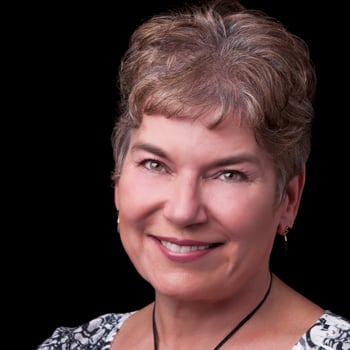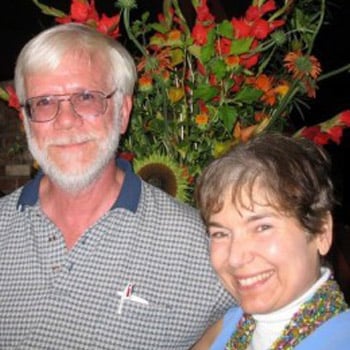October 2020 member spotlight
Louise Andrew, MD, JD
Emergency Medicine
British Columbia, Canada
Q: How has this newly elected GC member handled retirement?
A: I actually have “retired” twice. The first attempt was when my husband Ted Harrison and I emigrated to Canada in 1998, I increased my teaching, consulting and counseling of physicians, and started an organization to educate physicians about the ethical requirements and obligations we have when serving as expert witnesses.
After a time, we both missed patient care. Living just over the border, we realized we were perfectly able to practice in an adjacent state. We had maintained our licenses and CME, and participated in volunteer missions abroad, and decided to re-equip ourselves to practice a new and exciting specialty, in which we might grow old more healthfully ourselves. Anti-aging and regenerative medicine was as undeveloped as was Emergency Medicine when we adopted that maverick young specialty in 1975. And we loved our new endeavor because we were able to help ourselves, by helping our wonderful patients to learn and to do what WE do for our own longevity.
Sadly, COVID-19 changed all that. Our idyllic 90-minute commute via ferry over a strait replete with whales and dolphins ended when the ferry closed down (after 50 years of continuous operation). Now, the commute is six hours, via two ferries and an arduous border crossing. So this Spring, we made the difficult decision to retire from our practice.
Q: What kinds of activities helped you transition to retirement?
A: What has helped enormously, is keeping up with all the friends we have made through 30 years of international education and exchange programs in emergency medicine and more recently doing prolotherapy. Missions to interesting places where we may be the only source of medical care available to indigent citizens will resume after the pandemic; the organizations that sponsor these missions also need input and member leadership, which my husband are I are happy to help provide.
Being elected delegate to represent our SPS has also helped me incredibly because I am surrounded by others of a similar or greater generation who have already negotiated aspects of this passage. Plus, I have the opportunity to bring a fresh perspective and avenues to others who hope to find meaningful engagement with the AMA-SPS.
Q: How likely are you to continue working in the field of medicine in a non-clinical role upon retirement?
A: I view almost any role that I might play as effectively BEING clinical, because to the extent that I can help other doctors remain clinically active at whatever level they desire, I am actually facilitating the practice of medicine (I’m fifth generation. My surgeon grandfather practiced until he was 81.) The missions provide a continuing source of inspiration because of the gratitude and open affection of the patients we serve. Sponsoring groups consist of similarly altruistic physicians. We PAY to volunteer. There are no other medical organizations where you routinely examine and treat each other whenever time allows, for those common musculoskeletal conditions that most of us experience, and that too few others know how to treat effectively. This creates a unique bond of trust and camaraderie.
Q: Were there resources available to help you prepare for retirement? Were any resources lacking?
A: While I chaired the Wellness Committee of the American College of Emergency Physicians, a stellar member who was just a bit wiser created a primer for emergency physicians in the pre-retirement years. It answered almost all of my questions. That wonderful person, I am happy to say, is now a member of our SPS; and I hope he will help us to create a newer and even fuller resource for what one does after one actually fully retires.
Q: How do you believe retirement impacts a physician’s family life?
A: I know for more traditional couples retirement can be a source of marital strain if there is no pre-planning for useful (individual and joint) activities to fill the rest of a long and mutually satisfying life. For us, it is just another of several transitions we have made. We will never willingly stop learning or doing things that improve the world in various ways, especially those that allow us to travel to interesting places in order to do so.
Q: Is there anything else you would like to share about being a retired physician?
A: I may be cheating by saying I am a “retired physician” since I’m really still just a baby at this. I can share that I am optimistic, energized and enthusiastic that those of us who are “of retirement age” may be uniquely empowered, by virtue of our many years of experience coupled with a certain degree of sanguinity and equanimity, to help younger physicians now suffering mightily in the wake of the pandemic. We have weathered several similar crises. We survived and are better for it. Perhaps we are also more free now to speak up for junior colleagues who may be struggling, yet fearful of the consequences.
Contact us
Have information about SPS members doing great work? Email us at [email protected].





